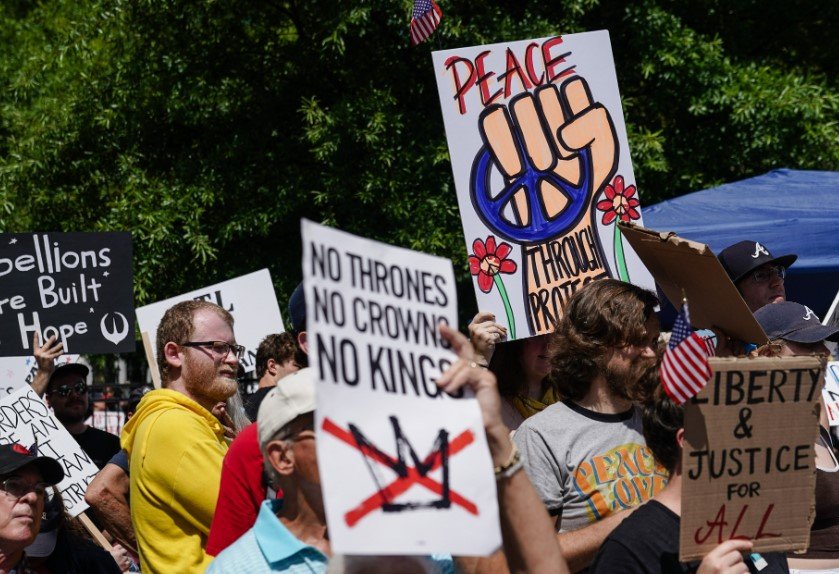Detained while reporting a protest, Mario Guevara’s case alarms advocates and raises fears for immigrant reporters under tightening federal scrutiny
Mario Guevara was livestreaming a protest. His phone was recording. His vest read “PRESS” in large, white letters. And then, suddenly, he was in handcuffs.
The Salvadoran-born journalist — who has lived in the U.S. for two decades — is now in ICE custody, facing possible deportation. He was arrested on June 14 in DeKalb County, Georgia, while covering an immigrant rights protest. The charges? Alleged unlawful assembly and obstruction. But for many watching the footage — and reading his reporting over the years — it doesn’t look that simple.
A Reporter Turned Detainee
Guevara has spent years documenting immigrant life in Georgia, often focusing on raids, deportations, and community tension. That makes his arrest particularly jarring — and for some, deeply symbolic.
He wasn’t hiding his identity. He was clearly marked as press. His video showed the moment law enforcement approached him. “I’m a member of the media, officer,” he says just before being restrained. Then the phone tumbles. A cop picks it up. Guevara is taken away.
That wasn’t the end. Not even close.
He was handed over to Immigration and Customs Enforcement — ICE — and now sits in federal custody, pending further immigration proceedings.

DHS Pushes Back, But Doubts Linger
The Department of Homeland Security says Guevara wasn’t arrested because he’s a journalist. According to DHS, he entered the U.S. illegally in 2004 and has no legal grounds to stay. They’ve urged him to voluntarily return to El Salvador.
But his lawyer, Giovanni Diaz, says that story doesn’t hold up.
According to Diaz, Guevara arrived in the U.S. on a tourist visa and has valid work authorization. Not only that — he’s currently waiting on a pending adjustment of status application, a legal step that could lead to permanent residency.
Just one sentence here.
Legal Status, Journalism, and the Gray Area in Between
What makes Guevara’s arrest so loaded is the intersection of his immigration status and his profession. He’s not just any noncitizen — he’s a reporter, covering protests related to immigration, arrested while doing that job.
The Committee to Protect Journalists isn’t staying silent.
Katherine Jacobsen from CPJ called the arrest an “alarming precedent,” warning it could chill press freedom — especially among noncitizen reporters. CPJ also sent a letter to DHS condemning the move and calling it a “grim erosion” of constitutional norms.
• CPJ warns of chilling effect on immigrant journalists
• DHS maintains arrest was not press-related
• Guevara’s status legally murky, awaiting adjustment decision
• Concerns grow over pattern under Trump-era enforcement approach
The implications? Deep. Especially for the growing number of independent reporters from immigrant communities who don’t have the protections or visibility of larger outlets.
Who Is Mario Guevara?
To his followers, Guevara isn’t just a reporter. He’s a fixture in Georgia’s Latino media landscape.
He’s worked with Spanish-language outlets across the state. And most recently, he founded MG News — an independent platform focused on immigrant issues. His reporting is raw, unpolished, unfiltered. Often live. Always personal.
Born in El Salvador, Guevara fled violence in the early 2000s. He’s lived in the U.S. for nearly 20 years. He built a life here. A network. A voice. Now, all of that feels fragile.
One paragraph, one sentence.
And it’s not just his future that’s unclear — it’s the precedent this sets.
What the Arrest Tells Us About Press Freedom and Policing
The visuals were hard to ignore: a Latino journalist in a press vest, calmly filming, arrested mid-broadcast.
Legal experts say this raises serious First Amendment concerns. The fact that Guevara is a noncitizen complicates things — but doesn’t erase the protections journalists are supposed to enjoy while covering protests.
Here’s a quick snapshot of where things stand legally:
| Topic | Guevara’s Case | Legal Implications |
|---|---|---|
| Press ID | Clearly marked “PRESS” | Adds weight to First Amendment claims |
| Arrested for | Obstruction, unlawful assembly | Could be challenged as unlawful |
| ICE Status | In custody | Awaiting immigration review |
| Legal Counsel | Giovanni Diaz | Disputes DHS account, citing visa history |
| Community Response | Strong media advocacy | CPJ, local outlets speaking out |
Press rights advocates are watching closely. So are immigrant rights groups. So are other reporters — especially those who’ve faced similar threats.
A Bigger Picture — And A Bigger Question
Is this about Guevara alone? Or is it about something bigger?
That’s what worries journalists and immigration lawyers. The Trump administration’s enforcement strategies have placed renewed focus on detentions and removals, with less room for discretion. That’s a problem for people like Guevara — who occupy a gray space legally, but a clear space professionally.
And when police start detaining reporters covering protests? The chilling effect is very real.
Even reporters with legal status have privately said they’ve begun thinking twice before covering protests. Especially those involving ICE or police. Especially if they’re people of color. Especially if their outlet isn’t backed by corporate legal teams.
Just one more sentence to pause here.
Guevara’s story isn’t over. His legal team says they’re pursuing every option to secure his release and fight deportation. But the damage — to him, to press freedom, and to public trust — may already be done.
